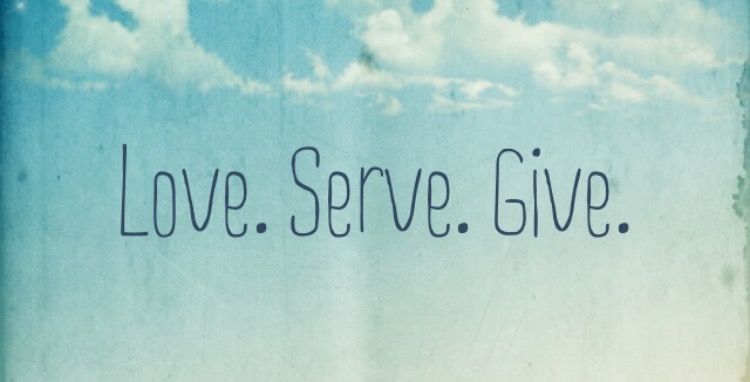Service to others is a part of nearly every religious, spiritual, and philosophical tradition on the planet. In many eastern practices, such as yoga, one of the primary ethics and ways of life is through selfless service. But perhaps selfless service is not the best way to describe this practice as anything we do to uplift, bring joy, or provide service to others, ultimately is Self-serving. It is not possible to serve others without receiving benefit from it. The eight limbs of yoga as laid out by Patanjali are a perfect example. Why are the yamas (ethics and guidelines for how we treat others) number one on the path? Yoga is all about uncovering the True Self. Patanjali recognized that for us to realize our Divine nature, how we treat and serve others is essential as this is ultimately how we treat and serve our Self. When we serve others, we actually receive more benefit than the one(s) being served.
Selfless service is a paradox. Karma yoga or selfless sacred service is a way to embody spiritual practice and consciously evolve. Our karma consists of our choices. Certain choices we make lead us on different paths. We identify something as good or bad based on the desired outcome. To reap peace, love and happiness for our self, other beings and the planet, we must sow peace, love, and happiness in our hearts through kind words, thoughts, and deeds to all beings and the earth. Any action we take to benefit the lives of others ultimately benefits us!
Serving others assists us with becoming more aware of the spirit of God in every being. When we give of our time and share our unique talents and gifts for the benefit of others and the greater community (without self-righteousness or unhealthy ego), we co-create a more peaceful world that all may thrive in.
“What’s crucial is that we understand that loving others is not just a question of being nice. There is a precise, psychological method to loving others that must be engaged in with a specific intention and focus. An yet, this ethic is entirely selfish, because, if we practice it, we always get more out of the encounter than we put into it. When we strive to uplift others, they move closer to their higher-self knowledge and sense of purpose. And in doing so, often we are provided with a synchronistic message, perhaps the very one we were waiting to hear.” –James Redfield, The Celestine Vision
Ways we may be of service:
1. Serve Me, Myself and I: This is an important aspect of selfless service and is often left out. To effectively serve others we are to take good care of ourselves. Making time for spiritual practice, whatever it may be that fuels the spirit, be it asana, meditation, pranayama, satsang, etc., do it! When we honor the need to serve ourselves, we are supplied with an abundance of health, stamina, compassion, love, patience, generosity, and respect do the work necessary to create positive change within and without.
“By making the time to practice for yourself, you are not wasting your efforts; on the contrary, you are using your time wisely. The Buddha taught us not to neglect ourselves but to take care of ourselves. He encouraged us to practice intelligently, to look deeply into our suffering, and to take effective actions to transform it. To be helpful to others, you have to give yourself permission to practice for yourself; you cannot neglect yourself. No one is more worthy of your kindness and compassion than you are…As you [practice], listen to your body and listen to your consciousness. When we reconnect with ourselves, take time to listen to our body and mind, and to learn from them, we will know what to do and what to avoid–giving our body and consciousness a chance for healing, transformation, and peace. When we restore peace within ourselves, we have a chance to restore peace in others.” –Thich Nhat Hanh
2. Serve All Beings: Serve others by seeing God or the true self in every being encountered throughout the day. This is a powerful practice with powerful effects. We begin to realize that all beings are God and God is in all beings. We are all ONE. The service of seeing God in all beings and treating all others as we treat our self, as we treat God moves us closer to the understanding and realization of our True Self, which is our God-Self.
In the Bhagavad Gita, chapter 3, verse 10, Krishna tells Arjuna, “Since the beginning, mankind and the obligation of selfless service were created together. Through selfless service you will always be fruitful and find fulfillment”. Krishna goes on to say in chapter 3, verse 13, “The spiritual minded who eat in the spirit of service, are freed from all sins; but the selfish, who prepare food for their own satisfaction, eat sin”. When our food choices are made consciously to uplift the lives of others, we create greater peace and happiness for all.
“The service to all sentient beings as being disguises of God is, I believe, one of the great healing powers of Sacred Activism. Performing it humbly in the heart of life allows you to experience more and more strongly three related forces that will strengthen you-the force of your own innate compassion, the force of the Divine Presence in every being, and the force of Divine Presence in reality.” –Andrew Harvey
“It is easy to tell how happy someone is by observing how compassionate she is toward others. Life is precious. Those who recognize this preciousness and offer peace and protection to other living beings find peace and protection available to themselves. If we are motivated to protect the lives of all animals, even the smallest insect, then we will never want to take a human life. With compassion, you see others as yourself. You see how we all inter-are. So many people feel completely cut off from life and its many forms. We all need to find the conditions to develop our compassion.” –Thich Nhat Han
3. Serve Locally: It is of vital importance to provide service to our local community. How each of us chooses to serve our local community may be very different. We all have unique talents and gifts to share, and there are many ways to serve. Each of us connects with something that is meaningful, that fulfills a purpose, and facilitates the kind of positive change we are seeing in the world. Whatever it is that we feel provides a great service to others in for a thriving community, now is the time to plug in and get more deeply involved.
Serving the local community not only implies that we volunteer time or donate to a cause we feel passionate about, though, those are great ways to serve. It is also consciously choosing where we shop and purchasing items from businesses with ethical practices. It may be serving the place where we work by the sweeping the floor or putting extra time into a project being worked on. It may be offering a service to an underserved community by sharing a unique talent such as teaching a yoga class, art, etc. It may be serving our family and friends, providing them with education and finding ways to uplift their lives. The energy we put into something benefits those we are serve, as well as us.
4. Serve Globally: We live in a time, where now, more than ever, the world is calling us to serve. So, how do we serve the global community? We begin by educating ourselves and raising our level of awareness as to what is going on in the world today. For example, how many of us are aware that today there are more human slaves on the planet than ever before (that we know of). Or what about the fact that 27 million animals are killed every day in the US for human consumption…Or the deforestation and destruction of the planet of not only raising animals for food, but growing fruits, grains, nuts, seeds and vegetables by spraying toxic chemicals (pesticides and herbicides) that destroy the soil, water, eco-systems and millions of wild species. And the list goes on and on.
When we are educated, we make informed decisions about everything we do in our lives, with consideration as to how it impacts the global community. Through education, we find our lifestyle choices dramatically change…certain brands of clothing or shoes we purchase, where we buy our coffee, what foods we eat, what organizations and businesses we support, and on and on and on.
“In this world crisis, every single human being from every walk of life is in danger, and each choice we make affects everyone else. The only possible response to this acute interconnectedness is what the Dalai Lama calls “Universal Responsibility,” the decision to be conscious in the core of our lives of the effect of all of our choices-economic, social, political-congruent with our most compassionate beliefs.” –Andrew Harvey
“I am convinced that it is essential that we cultivate a sense of what I call Universal Responsibility…To develop a sense of universal responsibility–of the universal dimension of our every act and of the equal right of all others to happiness and not to suffer–is to develop an attitude of mind whereby, when we see an opportunity to benefit others, we will take it in preference to merely looking after our own narrow interests. Of course we care about what is beyond our scope–we accept it as part of nature and concern ourselves with doing what we can…An important benefit of developing such a sense of universal responsibility is that it helps us become sensitive to all others–not just those closest to us.” -14th Dalai Lama
According to Andrew Harvey, to serve the global community as a way of providing sacred service means, “Always remembering to pray for the happiness and safety of all sentient beings, both when you begin your private spiritual practices and when you end them; it means dedicating all merits and benefits of your practice, both at the beginning and the end, to all other beings everywhere; it means committing to being deeply informed on the major crisis afflicting the planet, especially our growing environmental challenges; it means having the integrity to see that your money is not invested in corporations that destroy the environment or exploit sweatshop labor; it means buying a fuel-efficient car and taking as much public transportation as you can; it means becoming aware that our meat-eating habits not only cause great pain to the animals we slaughter, but also engender massive environmental abuse in the clearing of forests for agriculture…”
– Anna Ferguson

